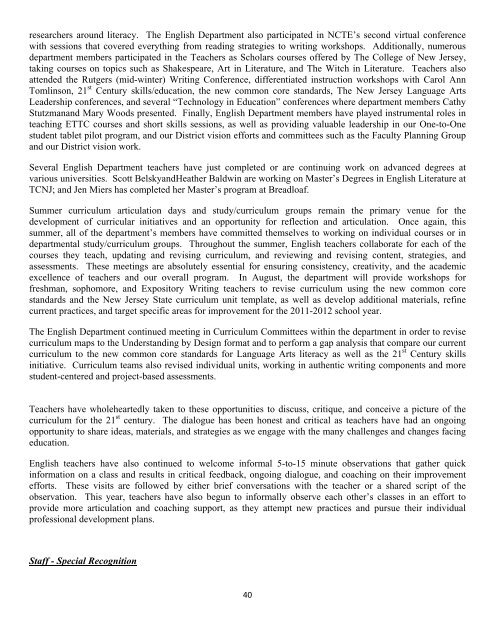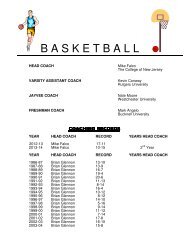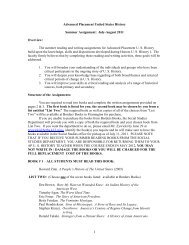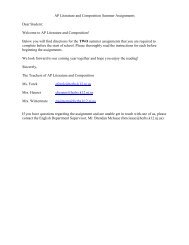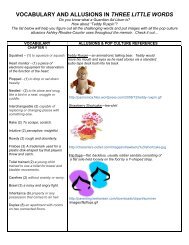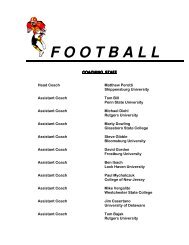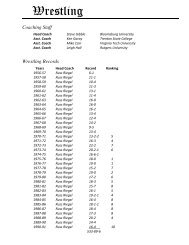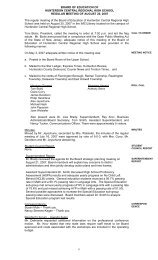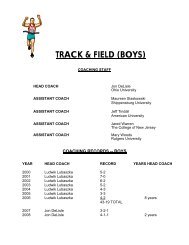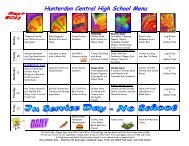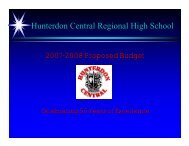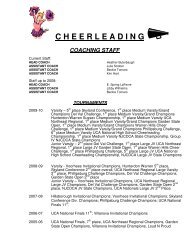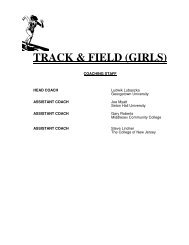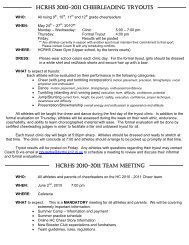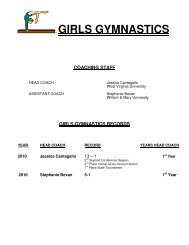HUNTERDON CENTRAL REGIONAL HIGH SCHOOL DISTRICT
HUNTERDON CENTRAL REGIONAL HIGH SCHOOL DISTRICT
HUNTERDON CENTRAL REGIONAL HIGH SCHOOL DISTRICT
Create successful ePaper yourself
Turn your PDF publications into a flip-book with our unique Google optimized e-Paper software.
esearchers around literacy. The English Department also participated in NCTE’s second virtual conference<br />
with sessions that covered everything from reading strategies to writing workshops. Additionally, numerous<br />
department members participated in the Teachers as Scholars courses offered by The College of New Jersey,<br />
taking courses on topics such as Shakespeare, Art in Literature, and The Witch in Literature. Teachers also<br />
attended the Rutgers (mid-winter) Writing Conference, differentiated instruction workshops with Carol Ann<br />
Tomlinson, 21 st Century skills/education, the new common core standards, The New Jersey Language Arts<br />
Leadership conferences, and several “Technology in Education” conferences where department members Cathy<br />
Stutzmanand Mary Woods presented. Finally, English Department members have played instrumental roles in<br />
teaching ETTC courses and short skills sessions, as well as providing valuable leadership in our One-to-One<br />
student tablet pilot program, and our District vision efforts and committees such as the Faculty Planning Group<br />
and our District vision work.<br />
Several English Department teachers have just completed or are continuing work on advanced degrees at<br />
various universities. Scott BelskyandHeather Baldwin are working on Master’s Degrees in English Literature at<br />
TCNJ; and Jen Miers has completed her Master’s program at Breadloaf.<br />
Summer curriculum articulation days and study/curriculum groups remain the primary venue for the<br />
development of curricular initiatives and an opportunity for reflection and articulation. Once again, this<br />
summer, all of the department’s members have committed themselves to working on individual courses or in<br />
departmental study/curriculum groups. Throughout the summer, English teachers collaborate for each of the<br />
courses they teach, updating and revising curriculum, and reviewing and revising content, strategies, and<br />
assessments. These meetings are absolutely essential for ensuring consistency, creativity, and the academic<br />
excellence of teachers and our overall program. In August, the department will provide workshops for<br />
freshman, sophomore, and Expository Writing teachers to revise curriculum using the new common core<br />
standards and the New Jersey State curriculum unit template, as well as develop additional materials, refine<br />
current practices, and target specific areas for improvement for the 2011-2012 school year.<br />
The English Department continued meeting in Curriculum Committees within the department in order to revise<br />
curriculum maps to the Understanding by Design format and to perform a gap analysis that compare our current<br />
curriculum to the new common core standards for Language Arts literacy as well as the 21 st Century skills<br />
initiative. Curriculum teams also revised individual units, working in authentic writing components and more<br />
student-centered and project-based assessments.<br />
Teachers have wholeheartedly taken to these opportunities to discuss, critique, and conceive a picture of the<br />
curriculum for the 21 st century. The dialogue has been honest and critical as teachers have had an ongoing<br />
opportunity to share ideas, materials, and strategies as we engage with the many challenges and changes facing<br />
education.<br />
English teachers have also continued to welcome informal 5-to-15 minute observations that gather quick<br />
information on a class and results in critical feedback, ongoing dialogue, and coaching on their improvement<br />
efforts. These visits are followed by either brief conversations with the teacher or a shared script of the<br />
observation. This year, teachers have also begun to informally observe each other’s classes in an effort to<br />
provide more articulation and coaching support, as they attempt new practices and pursue their individual<br />
professional development plans.<br />
Staff - Special Recognition<br />
40


